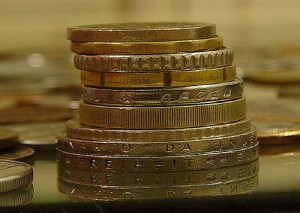What We Should Fear Volume One: Inflation

Photo by: grahammclellan
The economy is always fraught with peril. Your savings and investments are always subject to risk, and it’s your job to protect them. Unfortunately, if it were easy to identify the risks out there, we’d do a better job of avoiding them. One problem that seems to loom in the future of every investment decision is monetary policy.
Depreciation
The current crisis is one of deflation. People have less money and feel less secure, so they spend less money. This means that companies have to charge lower prices and make less money, which leads to layoffs, which leads to people having less money and feeling less secure. 1 This cycle is very much like the reverse of the bubbles that we’ve seen in various markets. The bust is the logical opposite of the boom.
The key difference between the boom and the bust is that the government feels compelled to step in and try to ameliorate the effects of the bust. They may give lip-service to trying to prevent bubbles, but ultimately their jobs depend on appearing to help “solve” a suffering economy. Whether or not they can be effective is really beside the point, they have to be seen as “trying.”
The Consequences
The natural upshot of all of this is what is referred to as counter-cyclical policy. When the private sector is not spending, the government steps up to fill the gap. Hopefully, the things the government spends its money on providing long term benefits, as well as the short term benefit of creating jobs and demand. While it may seem like any kind of spending will help break the vicious cycle of depreciation, hopefully you can also reap lasting benefits out of it. A good example is updating infrastructure like highways or utility grids. Whether this is the best application is debatable, but ultimately the idea of counter-cyclical spending is a fairly well accepted one.
What this ultimately means however is that in the long term the real threat to your wealth is not the deflation cycle. In fact the deflation cycle is actually making your savings worth more, while devaluing your assets like your house. What you ultimately have to fear is the eroding power of inflation. While the government has always sought to keep inflation in check, there are several reasons to think its toolbox will be empty when the time comes.
Inflationary Policy
Anyone who has been paying close attention to government policy recently has seen monetary figures unlike any in recent memory. The TARP is 700 billion, but represents only a fraction of the money that has already been spent to inject stability and liquidity into the system. This is before all the counter-cyclical spending that the new administration is planning. Regardless of the efficacy of these plans, there seems very little to prevent them from happening. In fact the incoming President has told us to brace for TRILLION dollar deficits for some time to come.2
While the government can posture about how it will cut spending or find other sources for this money, ultimately it will be borrowing it. It will create a huge debt and will have to escape from it. The natural escape is through inflationary policy. By “printing” more money (printing isn’t really necessary anymore, but it’s the same effect), the government will reduce the value of that debt. This will make it easier to manage, but ultimately will punish those with cash in the bank.
How To Protect Your Cash
TIPS are a very attractive means to protect any savings you currently have. TIPS, or Treasury Inflation Protected Securities, are like normal Treasury Bonds, but your principal is adjusted for the Consumer Price Index (a measure of inflation). Obviously you will receive a lower interest rate than you would with normal Treasuries; but if you believe the inflation will exceed that difference, then they are a better deal. Currently, because of deflationary pressures, this differential is not as great as current spending should suggest.
With the current deflationary effects, and no crystal ball to know where it ends, actually purchasing TIPS can provide you a very safe location for your money. Not only will they be protected from inflationary pressures, they are guaranteed to retain their value.3 Even if inflation is negative, you will do no worse than your original investment, which means you still will have effectively made money.
For those who are feeling very risk averse and who are concerned about inflation as a result of the current levels of government spending, TIPS provide a safe place to make sure your money is safe. While they aren’t going to provide fantastic net returns, they are at least going to keep up with inflation, which may not be such a bad deal.


















